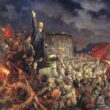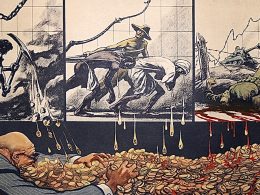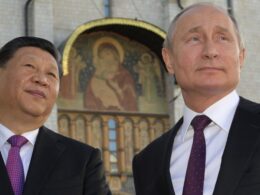Lenin informed us how we must view Russia’s Operation Z. He wrote that “One of the forms of deception of the working class is pacifism and the abstract preaching of peace. Under capitalism, particularly in its imperialist stage, wars are inevitable. On the other hand, Social-Democrats [the term Lenin was using at the time for Russia’s Marxists] cannot deny the positive significance of revolutionary wars, i.e., not imperialist wars, but such as were conducted, for instance, between 1789 and 1871, for the purpose of abolishing national oppression and creating national capitalist states out of the separate feudal states, or of possible wars for the defence of the gains of the victorious proletariat in the struggle against the bourgeoisie.” This reality about the nature of revolutionary wars shows why Z should be backed by all Marxists.
Social pacifists vulgarize what “imperialism” means
To understand why he referred to those wars as revolutionary despite them having been fought by bourgeois elements, and in America’s case having had a settler-colonial contradiction, one must understand the thesis of Mao’s On Contradiction: that the mere presence of contradictions in a historical force doesn’t necessarily make that force reactionary. If it’s fighting against the force that’s reactionary in the given historical context, and if it’s not a rival version of that same reactionary force or a retrograde force, then it’s by definition a progressive force. In the case of those revolutionary wars Lenin talked about, the reactionary enemy was monarchical rule. In the case of the revolutionary war that Russia is waging, the reactionary force is imperialism.
This reality about the nature of today’s international situation can’t be accepted by those with an ideological stake in viewing Russia as itself being an imperialist power. They vulgarize the definition of “imperialism” to make it encompass even a country like Russia, which is a semi-peripheral federation that lacks the socioeconomic relationship to the peripheral countries required for it to fit the definition of an imperialist power. Among those who call themselves Marxists, this practice is most common among the sectarian strains like the Maoists, who aren’t relevant enough for me to polemicize against too significantly. But among the more prominent and publicly visible communist strains, there’s also a tendency to decry Z. The stance of this tendency is softer than that of the Maoist ultra-leftists, opting to merely categorize Z as reckless or vaguely unjust rather than outright imperialist. So is the case for the way Z is often talked about in broader leftist foreign affairs commentary.
We can’t expect non-Marxists to be pro-Z, at least not under our current pro-imperialist cultural hegemony. But if somebody seeks to effectively practice Marxism, being pro-Z is the correct theoretical stance to take. That’s going off of the politically and militarily strategic theory which was articulated by Kim Il Sung, who in this passage indirectly repudiates social pacifism:
If preparations are not made to meet the decisive hour of the revolution by preserving the revolutionary forces against the enemy’s suppression and, at the same time, constantly accumulating and building them up through a positive struggle, it will be impossible to win victory in the revolution even when the objective situation has been created. To turn away from the revolution on the pretext of avoiding sacrifices is in fact tantamount to forcing the people to remain in lifelong slavery to capital, forcing them to tolerate for ever the cruel exploitation and oppression, unbearable maltreatment and humiliation, enormous sufferings and sacrifices. In general the acute pain experienced at a revolutionary turning-point is always much easier to endure than the chronic pain caused by the ulcers of old society. The social revolution cannot be achieved as easily as proceeding along a royal road in full daylight, nor can it progress as smoothly as a boat sailing before the wind. On the path of revolution, there may be rough thorny bushes and turns and twists, and there may be temporary setbacks and partial sacrifices. To flinch before difficulties and to hesitate in the revolution for fear of sacrifices is not the attitude befitting a revolutionary.
The foremost promoter of social pacifism regarding the Ukraine conflict is the Communist Party USA. It prefaces its argument against Z with a statement that, when you study Mao’s analysis of contradictions, on its face goes against the Marxist position on how to handle contradictions: “don’t you know comrades, that capitalism was restored in Russia and that the country is now led by a ruling class whose ill-gotten gains were the result of the wholesale theft of public property after the USSR’s collapse?” It’s as if Kim Il Sung preemptively provided the counterargument to this kind of dishonest appeal which would be made by the distorters of Marxism, having stated that: “The differences of state socio-political systems, political views or religious beliefs can by no means be an obstacle in the way of joint struggle against U.S. imperialism.”
Of course when the anti-imperialist struggle reached a point where a semi-peripheral capitalist country was struggling against imperialism, the revisionists would point to that country’s contradictions to try to discredit the anti-imperialist nature of its actions. Kim shut down this flawed reasoning.
To make their argument appear sound, the CPUSA cites a statement from one Communist Party of the Russian Federation member, which claims modern Russia fulfills Lenin’s named characteristics of imperialism. But this analysis lacks rigor, and was therefore evidently picked by the CPUSA in order to support their preferred conclusion rather than to genuinely investigate the situation. In the analysis that MR Online’s Stanfield Smith does on the economic relationships which Russia has with the peripheral countries, Smith concludes: “Referencing Lenin’s statement on imperialism, Russia is not a player in the dominance of monopolies and finance capital, nor does the export of capital play an important role (save the negative effect of on-going capital flight), nor do Russian trusts play any essential role in the division of the world resources.”
This statement is notably far greater in its substance than that of the statement from the CPRF member, whose words were rhetorical in their purpose rather than analytical: “The country has all the features of imperialism named by Lenin. It is monopolistic, parasitic and decaying capitalism.” Monopoly, parasitism, and decaying capitalism don’t on their own make for imperialism. The CPUSA needs to give more evidence.
When the social pacifists argue the military force that’s fighting the reactionary force is itself a rival version of the reactionary force, what they’re truly arguing is that the sacrifices the revolutionary war entails aren’t worthwhile. It’s objectively untrue that Russia is imperialist. What can still be subjectively argued is that Z’s costs aren’t worth its benefits. Which is the true essence of why the social pacifists take the stance they take. Their rhetoric about Russian “imperialism” is only a cover for the fact that they advocate for cowardice, for never taking action against imperialism out of fear of how imperialism will retaliate.
Social pacifists exaggerate the costs of Z
The same apprehension applies to the idea of supporting the revolutionary war, which comes at the cost of losing many opportunities for platforms and organizational partnerships. This steep sacrifice that comes with backing Z is why I suspect all U.S. communist parties, apart from the PCUSA, have declined to endorse Russia’s intervention.
Kim’s statement about the need to accept sacrifices doesn’t mean that every possible sacrifice should be automatically taken on while attempting revolution. It’s possible to miscalculate when the right moment is to go on the offensive, and to end up accidentally aiding the reactionaries. But in embarking on Z, Russia has not made this mistake. If anything, Z was launched years after the optimal conditions for it had been met, and Putin has been dragging his feet about taking strong action against Ukraine’s U.S. puppet regime. The only thing that makes his years of non-commitment on countering this regime subjectively justifiable is that he was using those years to prepare Russia’s economy for a total sanctions scenario. A measure which wouldn’t be necessary if Russia were still a more economically self-sustaining socialist republic, and Putin weren’t a bourgeois anti-communist leader.
What are these conditions that make a demilitarization campaign in Ukraine strategically sound? They’re the emergence of an existential threat towards Russia’s people, and the weakening of U.S. imperialism to the effect that Russia would come out on top in the economic war created by the intervention.
Since the 2014 U.S. coup, a junta of racist ultra-nationalists, its members either tied to or themselves being National Socialists, has been menacing the Russian speakers of the Donbass. Its officials have stated intentions for forcibly relocating these peoples, it’s used both Nazi paramilitaries and the National Guard to commit genocidal atrocities, and it’s remained in power after the election of a Jewish president by ruling through an immovable security state. It’s sought to deprive the Donbass liberation fighters of self-determination for their people, refusing to recognize the separatist project’s legitimacy and perpetually shelling the Donbass cities despite the sickening civilian costs. If Russia hadn’t stepped in, Kiev would have invaded and ethnically cleansed the Donbass.
I don’t even truly need to tell other communists about this. Anyone who theoretically and organizationally practices Marxism has already learned these facts about Ukraine’s situation. Yet it’s necessary to impress upon every Marxist that when we talk about denazification, when we talk about the need to demilitarize the Kiev regime, we’re not talking about an abstract concept. We’re talking about a clear and present humanitarian threat that’s being posed by a 21st century fascist government, a threat that Russia has a moral obligation to neutralize. The theoretical arguments of the social pacifists, which themselves are incorrect, can’t save the Donbass people from Kiev’s state violence. That violence has been impacting them for eight years, and Russia should have substantially defended them as soon as the threat appeared.
Beyond the moral imperative to defeat fascism, Z’s correctness is vindicated by how it’s proving to do more to harm imperialism than to help it. The damage the sanctions have done to Russia’s economy, the profiting from the war of the U.S. oil and arms industries, the expansion of NATO into Sweden and Finland, and the neo-McCarthyist censorship against anti-imperialism that the war has facilitated are all only “victories” for imperialism in a pyrrhic sense. They’ve come along with costs for imperialism that far outweigh these “benefits” Z has granted to them.
The context behind these negative developments is that Washington’s war against Russia has accelerated the decay of the imperialist bloc, to the effect that Russia will at this rate outlast the U.S. empire. Russia won’t need to come out of these sanctions unscathed. It will only need to continue functioning in a way that exceeds the expectations of U.S. officials for how well Russia would absorb the sanctions. The empire made a geopolitical gamble by provoking Russia into war. Its winning this gamble depended on Russia getting harmed worse than the imperialist bloc. That criteria hasn’t been fulfilled, and the empire is getting desperate.
Because Washington has seen its Ukraine maneuver on the geopolitical chessboard backfire, the U.S. and its allies have had their internal social stability eroded by the destructive domestic impacts of militarism. Their capitalist decline has sped up, and their people have grown more unruly. Should the communist movement in the imperial center navigate our conditions correctly, and ultimately come to overall reject the social pacifist stance, it will better be able to build allyship with the liberation movements across the formerly colonized world. These movements have in large part come to support Z, because they have a tangible relationship to imperialist violence and know an anti-imperialist action when they see it. That’s another thing Z has done to harm imperialism: make apparent just how isolated the U.S. empire has become, prompting most of the globe to reveal that its loyalty is not with Washington. Social pacifism is a position that’s harder to come to when one isn’t protected by the relative benefits of living in an imperialist country.
—————————————————————————
If you appreciate my work, I hope you become a one-time or regular donor to my Patreon account. Like most of us, I’m feeling the economic pinch during late-stage capitalism, and I need money to keep fighting for a new system that works for all of us. Go to my Patreon here.








